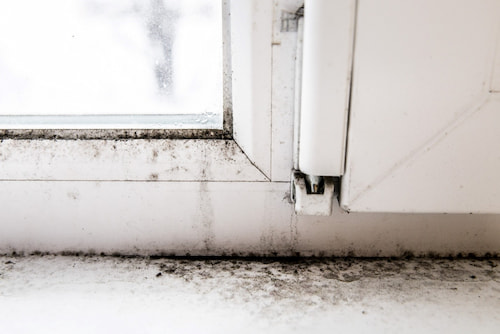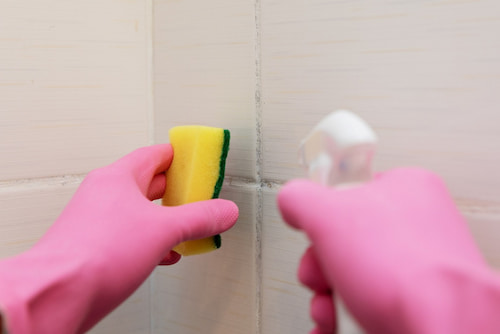Guide to Understanding Mold in Your Home
While civilization protects us against many of the elements of nature, there is one problem that continues to plague businesses and homes across the world: mold. What starts as tiny spores can turn into a significant fungus problem. Not only does mold smell and damage buildings, but over 20% of people have a susceptibility that makes fungal mold infections extra harmful.
Mold can grow on practically any damp surface, and is quite resilient in both low and high temperatures alike. Fortunately, you can take preventive measures to prevent or clear out mold growths. There are also key signs you can pay attention to that’ll help you know when to look for mold, or to see a doctor for treatment.
Here at the key facts you should know when it comes to dealing with mold:
How Can I Tell If I Have a Mold Problem?

Mold infestations start small, so it can be very hard to tell whether or not you should scour your home for mold. Fortunately, there are several key signs that may warn you of a mold issue. These signs include:
- Rotten or musty odors
- Stained or discolored carpets
- Unusual fuzz or growths in your furniture or clothing
- Allergy or asthma flare ups when you enter a room
- Persistent cold, cough, or runny nose
- Warped or tarnished walls, tiles, and roofs
- Musty, malfunctioning, or otherwise unusual A/C activity
- Unresolved water damage or constant leaking
If you experience these issues, especially if you suffer from asthma, it’s worth going around the house and checking for potential mold. Mold grows best in damp and wet environments, so it is especially important to look around after major spills or other water accidents in your home.
How Can I Prevent or Kill Mold Growing in My Home?
Mold can grow on almost any material surface, including tile, metal, paper, carpet, wood, and more. This can make guarding against mold difficult. However, mold colonies grow best in damp and wet environments. As such, focus your attention most in the parts of the home where there’s running water, such as your bathroom, kitchen, and laundry room.
There are many mold preventive and mold-killing products available that will help protect against mold and improve your indoor air. This includes spray bleach solutions, anti-mold paint, and just regularly scrubbing and drying wet surfaces. These solutions are available online, and often at your local general store.
One of the best ways to prevent mold growth is with air purifiers and filters. These filters are designed to filter out harmful spores and other chemicals in the air, enhancing air quality and protecting your long-term health. Remember to change out your air filters regularly, and consider buying additional air purifiers for rooms where mold infestations are likely. An air purifier with UV light helps to break down the spores so they can't replicate.
What Symptoms Could You Experience from Having a Mold Problem in Your Home?
Certain people are more likely than others to experience mold infections. However, when mold infestations grow large enough, even the healthiest among us are susceptible to mold allergies, affections, and even poisoning.
If you have had direct contact with mold, or suspect you’ve had contact and are experiencing the following symptoms, please schedule an appointment with your doctor right away:
- Stuffy or runny nose
- Sore or dry throat
- Constant dry cough
- Wet cough with mucus or blood
- Brain fog or memory issues
- General malaise or fatigue
- Wheezing or shortness of breath
- Constant skin irritation or itching
- Fever
- Chest pain
- Vomiting
- Diarrhea
Because of the many symptoms and allergies that can develop from mold exposure, it can be difficult to determine if your health problems are caused by mold or something else. If you suspect your health problems are caused by mold, your doctor will usually administer one of several tests to confirm the source of your infection.
The type of testing your doctor will recommend may depend on your symptoms and personal comfort. This may include a skin test, urine test, sinus test, or something else. Contact your doctor before your visit if you are concerned about how they might test you for mold exposure.
How Do Doctors Treat Mold Infections?

The recommended treatment for mold allergies and infections will vary from patient to patient. For mild symptoms and exposure, over-the-counter medication is used to decrease inflammation and suppress your other symptoms. Pain medication and nasal sprays may also be recommended to help clear out your passages and reduce your overall pain.
For patients with compromised immune systems or regular exposure to mold, prescription and regular allergy medicine may be recommended. It is also important to note that living a healthy lifestyle greatly reduces the risk of, and damage caused by mold. Make sure you eat a healthy diet, get sufficient sleep, perform daily exercise, and avoid intoxication when dealing or recovering from a mold allergy.
You may have heard that activated charcoal or carbon is a potential treatment for mold, especially since it is administered to pets that suffer from mold exposure. Activated charcoal does bind to toxins in the air, making it a great way to combat mold. It also binds to other, more helpful vitamins and nutrients as well, draining the body.
Do not ingest activated charcoal to treat mold allergy or infection unless recommended by your doctor. Failure to do so can lead to other significant health problems worse than those caused by mold exposure.
Keep Your Air Clean and Prevent Mold Growth with Air Health
Air Health is one of the premier air treatment companies in the United States. Backed by 95 years of expertise, with headquarters in Kinston, North Carolina, we offer a wide range of products that will purify your home air. With our state-of-the-art clean air filtration, UV and PCO technologies, you’ll guard your home not only against mold, but other harmful pollutants, viruses, and unwanted toxins and smells.
Whether you just want to replace your air filter or need to overhaul your air purification system, you’ll find a solution at Air Health. Contact us today by filling out our form or by email to learn how we can help you have fresher air in your home or business.
 US Dollars
US Dollars
